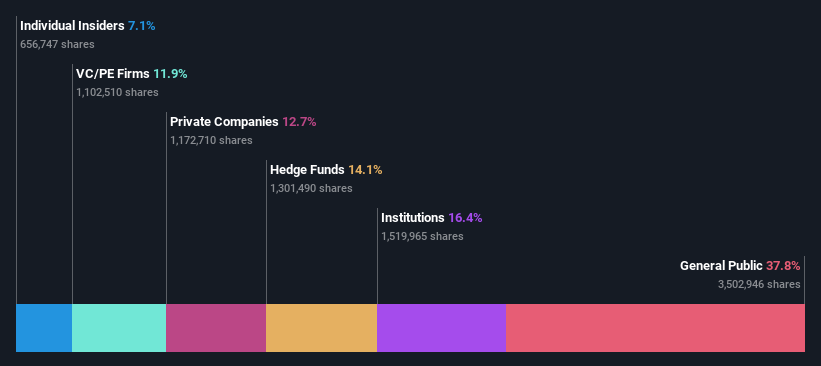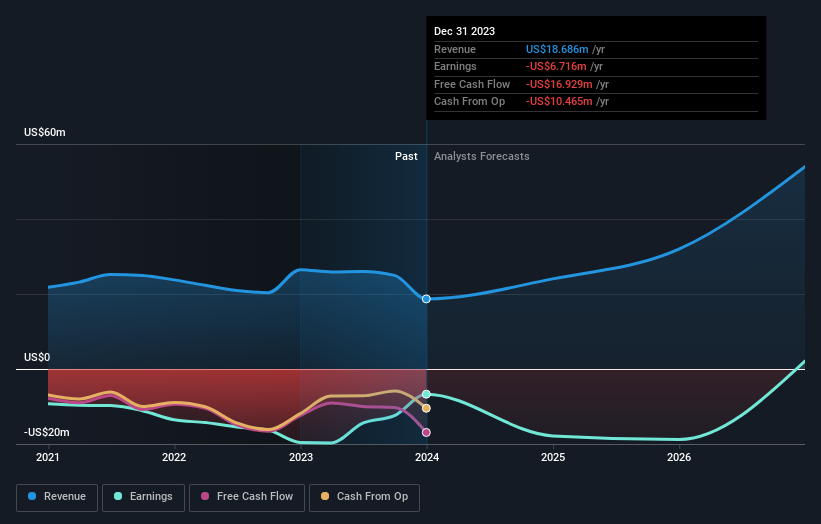Stock Analysis
- United States
- /
- Pharma
- /
- NasdaqGM:MDWD
While institutions invested in MediWound Ltd. (NASDAQ:MDWD) benefited from last week's 16% gain, individual investors stood to gain the most

Key Insights
- The considerable ownership by individual investors in MediWound indicates that they collectively have a greater say in management and business strategy
- 51% of the business is held by the top 10 shareholders
- Institutions own 16% of MediWound
If you want to know who really controls MediWound Ltd. (NASDAQ:MDWD), then you'll have to look at the makeup of its share registry. We can see that individual investors own the lion's share in the company with 38% ownership. In other words, the group stands to gain the most (or lose the most) from their investment into the company.
While individual investors were the group that benefitted the most from last week’s US$23m market cap gain, institutions too had a 16% share in those profits.
Let's take a closer look to see what the different types of shareholders can tell us about MediWound.
Check out our latest analysis for MediWound

What Does The Institutional Ownership Tell Us About MediWound?
Many institutions measure their performance against an index that approximates the local market. So they usually pay more attention to companies that are included in major indices.
MediWound already has institutions on the share registry. Indeed, they own a respectable stake in the company. This implies the analysts working for those institutions have looked at the stock and they like it. But just like anyone else, they could be wrong. It is not uncommon to see a big share price drop if two large institutional investors try to sell out of a stock at the same time. So it is worth checking the past earnings trajectory of MediWound, (below). Of course, keep in mind that there are other factors to consider, too.

It looks like hedge funds own 14% of MediWound shares. That catches my attention because hedge funds sometimes try to influence management, or bring about changes that will create near term value for shareholders. Clal Life Sciences L.P. is currently the largest shareholder, with 13% of shares outstanding. Point72 Asset Management, L.P. is the second largest shareholder owning 8.9% of common stock, and Israel Biotech Fund holds about 6.0% of the company stock. In addition, we found that Ofer Gonen, the CEO has 1.1% of the shares allocated to their name.
On further inspection, we found that more than half the company's shares are owned by the top 10 shareholders, suggesting that the interests of the larger shareholders are balanced out to an extent by the smaller ones.
Researching institutional ownership is a good way to gauge and filter a stock's expected performance. The same can be achieved by studying analyst sentiments. Quite a few analysts cover the stock, so you could look into forecast growth quite easily.
Insider Ownership Of MediWound
The definition of company insiders can be subjective and does vary between jurisdictions. Our data reflects individual insiders, capturing board members at the very least. Company management run the business, but the CEO will answer to the board, even if he or she is a member of it.
Most consider insider ownership a positive because it can indicate the board is well aligned with other shareholders. However, on some occasions too much power is concentrated within this group.
Shareholders would probably be interested to learn that insiders own shares in MediWound Ltd.. It has a market capitalization of just US$169m, and insiders have US$12m worth of shares, in their own names. It is good to see some investment by insiders, but we usually like to see higher insider holdings. It might be worth checking if those insiders have been buying.
General Public Ownership
The general public, who are usually individual investors, hold a 38% stake in MediWound. This size of ownership, while considerable, may not be enough to change company policy if the decision is not in sync with other large shareholders.
Private Equity Ownership
With a stake of 12%, private equity firms could influence the MediWound board. Some might like this, because private equity are sometimes activists who hold management accountable. But other times, private equity is selling out, having taking the company public.
Private Company Ownership
Our data indicates that Private Companies hold 13%, of the company's shares. It's hard to draw any conclusions from this fact alone, so its worth looking into who owns those private companies. Sometimes insiders or other related parties have an interest in shares in a public company through a separate private company.
Next Steps:
I find it very interesting to look at who exactly owns a company. But to truly gain insight, we need to consider other information, too.
I like to dive deeper into how a company has performed in the past. You can find historic revenue and earnings in this detailed graph.
But ultimately it is the future, not the past, that will determine how well the owners of this business will do. Therefore we think it advisable to take a look at this free report showing whether analysts are predicting a brighter future.
NB: Figures in this article are calculated using data from the last twelve months, which refer to the 12-month period ending on the last date of the month the financial statement is dated. This may not be consistent with full year annual report figures.
Valuation is complex, but we're helping make it simple.
Find out whether MediWound is potentially over or undervalued by checking out our comprehensive analysis, which includes fair value estimates, risks and warnings, dividends, insider transactions and financial health.
View the Free AnalysisHave feedback on this article? Concerned about the content? Get in touch with us directly. Alternatively, email editorial-team (at) simplywallst.com.
This article by Simply Wall St is general in nature. We provide commentary based on historical data and analyst forecasts only using an unbiased methodology and our articles are not intended to be financial advice. It does not constitute a recommendation to buy or sell any stock, and does not take account of your objectives, or your financial situation. We aim to bring you long-term focused analysis driven by fundamental data. Note that our analysis may not factor in the latest price-sensitive company announcements or qualitative material. Simply Wall St has no position in any stocks mentioned.
About NasdaqGM:MDWD
MediWound
MediWound Ltd., a biopharmaceutical company, develops, manufactures, and commercializes novel, bio-therapeutic, and non-surgical solutions for tissue repair and regeneration in United States, Europe, and internationally.
Flawless balance sheet with high growth potential.

